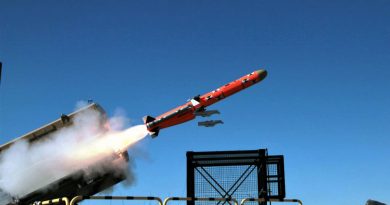
Surface-based air defence leads MBDA growth
At the yearly MBDA Group press conference, Eric Béranger, the CEO of the European missile company, stated that in 2023 70% of the order intake was related to surface-based air defence systems. He also announced improved results over 2022, which was already considered an “extraordinary year” by the CEO
“We are in a changing world, and 2022 was a wake-up call,” Béranger said, announcing that 2023 results further improved over the previous year. Total revenues stepped up from 4.2 to 4.5 billion Euro, order intakes increasing by 10% from 9 to 9.9 billion Euro, the backlog growing from 22.3 to 28 billion. Remaining in numbers, as anticipated 70% of orders intake was related to surface-to-air missiles and systems. As for the work force, 2023 saw the Group adding 2,500 employees, an intake of some more 2,600 being planned for 2024.
The backlog is evenly subdivided between the domestic market, which includes orders for France, the UK, Italy, Germany and Spain, and the export market. Of the latter, 75% was represented by orders of other European nations, the remaining 25% going to other continents customers.
In 2023 the major orders obtained in the domestic market were those for Aster missiles for France and Italy, Akeron MP and Mistral 3 for France, Enforcer for Germany, CAMM-ER for Italy, the evolution of the Sea Viper for the UK, and finally the Mistral 3 for Spain. In Europe, major contracts were those for CAMM in Poland and Sweden, and the mid-life refurbishment of Scalp missiles for Greece.
“Time has become an issue,” Eric Béranger stated in 2022, and he further underlined this during this year press conference, which took place at the Musée National de la Marine in Paris. “Today, force is increasingly challenging international rights. This is the fundamental change, and it is generating a lot of reactions and a lot of demands from our customers, in terms of urgent operational requirements. In 2023 both the UK and France asked MBDA to integrate very quickly Storm Shadows and SCALPs on aircrafts that had never been considered for this. MBDA did this in a matter of weeks, whereas usually it takes a few years to do this.”
Increasing production volumes and decreasing lead times are currently the main issues. In the 2023-2028 timeframe MBDA plans to invest 2.4 billion euro to improve the group production capability, “however I think this figure is probably likely to grow,” the CEO said.
Doing more and faster, this is the main target, mostly for products which have an impact on current needs, such as Aster, Mistral, CAMM, CAMM-ER, Brimstone, and so on. The first system which production has considerably accelerated is the Mistral VSHORAD missile, the final aim being to improve by four the monthly production and reduce by two the lead time. As for the other missiles, the production of the CAMM family will be multiplied by three, and that of the Aster by 1.5 with a much reduced lead time. “Before 2022, when time was not an issue, the period between order and delivery for Aster missiles was around 42 months, and now the target is to get below 18 months by 2026,” Béranger said. As for battlefield engagement systems, MBDA Germany started producing the Enforcer in late 2023, the aim being to reach by 2026 a yearly four-digit number, while the production of the Akeron MP is being multiplied by 2.5, the lead time being reduced by 40%.
“To do this we are investing in our production sites and in the tooling. Our Bolton facility in the UK will double its capacity, in Italy we are extending the buildings in our sites at Fusaro and Rome, while a second assembly line for the CAMM family will be created in northern Italy. In France we will double our production site, while in Germany MBDA is part of COMLOG, the joint venture with Raytheon that will produce Patriot GEM-T missiles in a new facility,” Béranger explained.
Increasing production is not enough should some key elements be missing. “Our second investment is in stocks, and this started in the COVID period,” the CEO said. Today some iron-based alloys are becoming difficult to find, therefore MBDA has in stock some 80 tonnes in response to a yearly need of 4-5 tonnes. “Titanium is another key element, and our stock is sufficient for producing several thousand missiles,” he added, explaining that MBDA is carefully analysing critical lead times for some electronic components to avoid gaps in supplies.
MBDA is also adapting working modes, “and here Artificial Intelligence will provide big opportunities to increase the productivity of our digital factories, and improving the way we work.”
The European missile company is also expanding its offer to customers. Among new products we find the hypersonic interceptor, the company being involved in the HYDIS2 European programme, lasers, in the UK with Dragonfire, in Germany, and in France, MBDA having acquired half the shares of CILAS, as well as loitering munitions.
“In the latter field we have won two contracts with the French Defence Innovation Agency, for the Colibri and the Larinae programmes, and for those we work closely with small and medium enterprises,” Eric Béranger said. He also underlined that MBDA won those contracts against some startups, which shows that while the company is known for its structured programmes, it is also capable to be very agile and dynamic in innovative fields, such as loitering munitions but not only, the CEO also mentioning Artificial Intelligence. Here he mentioned Orchestrike, MBDA’s Collaborative Combat Effectors demonstration, where a small team is looking at how to improve existing capabilities thanks to the use of AI. He also mentioned space, MBDA having recently taken part in the AsterX exercise.
Another key element is cooperation, which is part of the company DNA, Eric Béranger underlining how many programmes within MBDA involve different countries. He mentioned France, Italy and the UK on the Aster, the UK, Italy and now Poland on CAMM/CAMM-ER, the FC/ASW on which Italy is joining France and the UK, the company being currently in the process of switching to a three-nation programme, and the cooperation with Saab of Sweden on the Akeron MP, that will lead to a version of this missile adapted to the needs of the Swedish forces. He also highlighted the new ambitions of the European Union mentioning the European Defence Industrial Strategy (EDIS), which sets a clear, long-term vision to achieve defence industrial readiness, to increase EU autonomy.
In conclusion the MBDA CEO underlined how much, in the last five years, MBDA has changed in terms of portfolio, way of working and challenges. The backlog has increased by 50%, revenues by 40% and headcount by 30%, “which shows how much MBDA is evolving, our duty being to prepare ourselves to serve our customers in whatever way they would need us, and to be ready as much as possible to face the unexpected,” he concluded.
Photo courtesy MBDA



